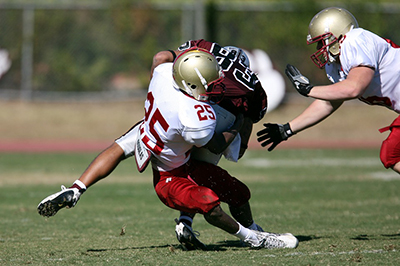THE OLD SAYING ABOUT “THERE’S NO I in team” still applies today. Even in sports like tennis in which players may compete one on one there is still a sense of camaraderie held together by school pride a love of the sport and the sheer volume of time spent practicing competing and traveling as a team.
BEING PART OF A TEAM
Of course there’s bound to be some intra-team competition as players compete for the starting point guard or shortstop position. But most athletes understand the rules of engagement from high school sports.
One issue freshman athletes aren’t always prepared for however is the depth of the talent pool—especially at more competitive colleges. Just because your bedroom at home is stacked to the ceiling with MVP trophies from high school doesn’t mean you’ll be an all-star as a college freshman. On the flip side the better your teammates the better you’ll become at your game. Don’t be afraid of the rock stars; learn from them!
EARNING SCHOLARSHIPS
You don’t have to be the star quarterback or captain of the varsity basketball team at your high school to earn a college scholarship for athletics—though it helps if you’re going after a football or basketball scholarship. But funding may be given to athlete-scholars who play sports while managing to maintain an exceptional GPA. There are also scholarships for sports in which there is currently an underserved population such as African American hockey players female rowers or even golf caddies.
In the United States Division I and II schools can offer athletic scholarships but Division III can’t. Ivy League schools do not offer any athletic scholarships.
To find scholarships you can check directly with your schools of interest check scholarship databases and visit your sport’s regional or national organizations such as the U.S. Lacrosse Foundation.
BALANCING ACADEMICS
You’re probably used to juggling schoolwork and sports from high school but everything about college athletics and academics is much much harder. You’ll likely have a heavier course load longer and harder practices more travel time to away games and some serious conditioning time (e.g. weight lifting running and swimming).
Your two biggest assets as an athlete-scholar will be organization and self-discipline. You’ll need to map out time to study whenever you can and reign yourself in when you need to sleep instead of staying out until 3 a.m.
Luckily the National Collegiate Athletic Association (NCAA) is on your side. There are strict rules to limit “countable athletically related activities” to no more than four hours per day and 20 hours per week. You also must get one day per week off (two days during the out-of-season conditioning period) and you can’t miss class for practice.
Still you’ll need to make friends with your calendar. Download one of the cool reminder apps on your phone to remember project due dates. Scope out a quiet spot in the library to study. If you’ve got the drive to be a college athlete you’ve probably got the skills to be a star student as well!



